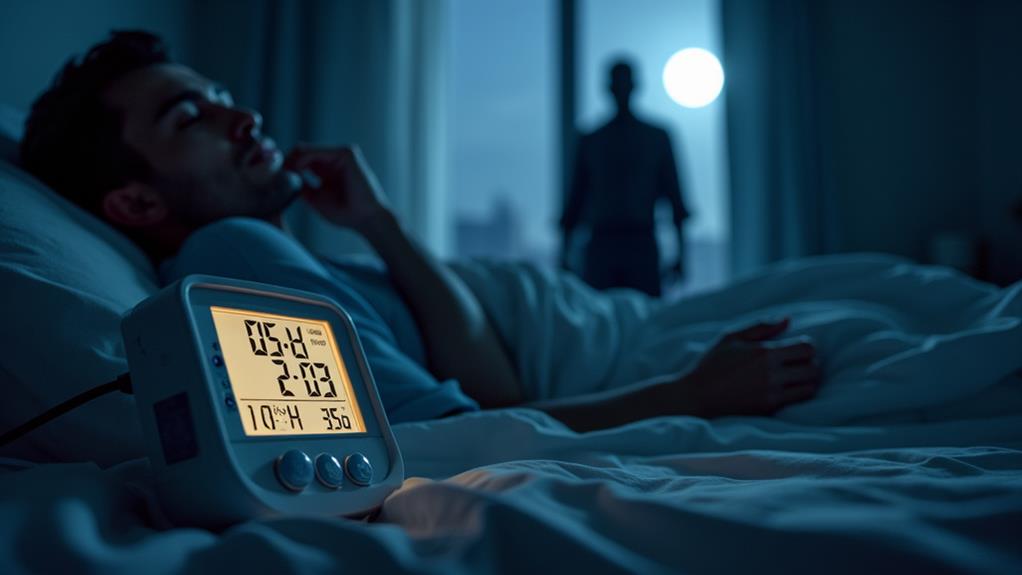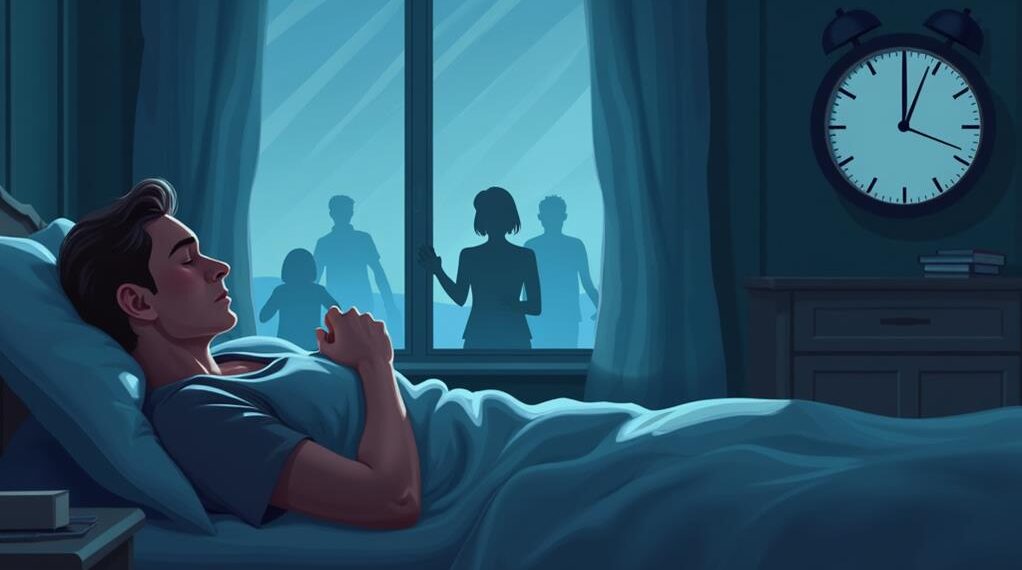If you've been feeling unusually tired or noticed changes in your sleep patterns, it might be time to reflect on the possibility of sleep apnea. This condition can manifest through several warning signs that are often overlooked, such as loud snoring and excessive daytime sleepiness. Ignoring these symptoms can lead to serious health complications, but recognizing them early can make all the difference. Curious about what specific signs you should be aware of? Understanding these indicators could be vital for your health.
Loud Snoring

Although many people snore occasionally, loud snoring can be a notable indicator of sleep apnea, a serious sleep disorder. When you snore loudly, it often occurs due to obstructed airways during sleep. This obstruction can result from various factors, including your sleep position.
For instance, sleeping on your back can cause your tongue and soft tissues to collapse toward the throat, obstructing airflow and leading to intense snoring.
Additionally, weight gain plays an important role in the development of sleep apnea. Excess body weight, particularly around the neck, can increase the likelihood of airway obstruction during sleep. If you've gained weight recently and noticed an increase in snoring, it's important to reflect on the connection.
Your body's distribution of fat can greatly impact respiratory function while you sleep. Monitoring your snoring patterns and analyzing how they relate to your sleep position and weight can provide insight into your overall health.
If your loud snoring persists, it's advisable to consult a healthcare professional. They can help determine whether sleep apnea is present and suggest potential treatment options to improve your sleep quality and overall well-being.
Gasping or Choking
Experiencing gasping or choking during sleep is a critical warning sign that may indicate the presence of sleep apnea. This condition often disrupts your sleep patterns, causing considerable breathing irregularities.
When your airway becomes blocked, you may momentarily stop breathing, leading to choking sensations as your body instinctively tries to resume airflow. These episodes can occur multiple times throughout the night, leaving you feeling startled and potentially awake.
It's important to note that these gasping or choking sounds may not always wake you completely, but they can still fragment your sleep, resulting in restless nights.
If you find yourself struggling to breathe or waking up with a dry throat, you might be experiencing the effects of sleep apnea. Over time, these disruptions can lead to serious health issues, including cardiovascular problems and daytime fatigue.
Monitoring your sleep patterns for these alarming signs is essential. If you or a partner notices frequent gasping or choking during your sleep, it's crucial to consult a healthcare professional.
Early diagnosis and treatment can greatly improve your quality of sleep and overall health.
Excessive Daytime Sleepiness

Throughout the day, excessive daytime sleepiness can greatly impact your ability to function effectively. If you find yourself struggling to stay awake during work meetings or while driving, it's important to reflect on your sleep quality.
Sleep apnea disrupts your breathing during sleep, leading to fragmented rest and insufficient restorative sleep, which can contribute to persistent fatigue.
When you experience excessive daytime sleepiness, it's not just about feeling tired; it can impair your cognitive functions, mood, and overall productivity. This state might signal that your body isn't getting the oxygen it needs during sleep, leading to a cycle of poor sleep quality and increased fatigue.
Effective fatigue management strategies are significant. Prioritize consistent sleep schedules, avoid caffeine before bedtime, and create a restful sleeping environment.
If you suspect sleep apnea, consult a healthcare professional. They can provide proper assessments and treatment options that may include lifestyle changes, CPAP therapy, or other interventions.
Addressing excessive daytime sleepiness is crucial for improving your quality of life and ensuring you can perform your daily activities with energy and focus. Don't ignore this warning sign; your health depends on it.
Morning Headaches
Morning headaches can be a troubling sign of sleep apnea and are often linked to the disrupted sleep patterns caused by this condition. When you experience frequent headaches upon waking, it can indicate that your sleep quality is compromised.
In sleep apnea, the airway repeatedly collapses during sleep, leading to intermittent breathing interruptions. This results in decreased oxygen levels and fragmented sleep, which can trigger morning headaches.
These headaches are typically tension-type or migraine-like and may vary in intensity. They often improve as the day progresses, making it essential to identify the underlying cause. If you find that these headaches persist, it's important to consult a healthcare professional.
Fortunately, there are effective treatment options available. Continuous Positive Airway Pressure (CPAP) therapy is commonly recommended, as it helps maintain open airways throughout the night.
Additionally, lifestyle changes like weight management, regular exercise, and avoiding alcohol can enhance sleep quality and reduce headache occurrences. By recognizing morning headaches as a potential sign of sleep apnea, you can take proactive steps toward better sleep health and overall well-being.
Difficulty Concentrating

Struggling to concentrate during the day can be a significant warning sign of sleep apnea. If you find that your focus drifts or you have difficulty completing tasks, it may indicate underlying cognitive impairment linked to disrupted sleep.
Sleep apnea causes repeated interruptions in breathing during sleep, leading to fragmented rest and inadequate restorative processes. This results in insufficient oxygen delivery to the brain, which can directly affect your cognitive function.
Attention issues are common among individuals suffering from sleep apnea. You might notice that you're more easily distracted or that your ability to retain information has diminished.
These cognitive deficits can hinder your performance at work or in daily activities, making it challenging to stay engaged in conversations or tasks.
If you regularly experience these difficulties alongside other symptoms like snoring or daytime fatigue, it's essential to consult a healthcare provider. They can evaluate your symptoms and recommend appropriate diagnostic tests.
Addressing sleep apnea not only improves your sleep quality but may also enhance your cognitive abilities and overall quality of life. Don't ignore these signs; they could be vital in identifying and managing sleep apnea effectively.
Mood Changes
Mood changes can often manifest as a subtle yet vital warning sign of sleep apnea. If you find yourself feeling unusually irritable or anxious, it mightn't just be stress but a deeper issue linked to your sleep quality.
Sleep apnea disrupts your breathing during sleep, leading to fragmented rest and insufficient oxygen supply to your brain. As a result, your irritability levels can skyrocket, making you more prone to anger and frustration over minor inconveniences.
Moreover, you may start to experience anxiety symptoms that seem to arise out of nowhere. This heightened state of anxiety can stem from sleep deprivation, which affects your emotional regulation and overall mental health.
Research indicates that individuals with untreated sleep apnea often report increased mood instability, resulting in difficulties in personal relationships and work performance.
Recognizing these mood changes is important, as they can greatly impact your daily life. If you notice these emotional fluctuations alongside other symptoms like snoring or daytime fatigue, it's vital to consult a healthcare professional.
Addressing sleep apnea not only improves your sleep quality but also helps stabilize your mood and enhance your overall well-being.
High Blood Pressure

High blood pressure, often referred to as hypertension, can be a vital indicator of sleep apnea and its effects on your cardiovascular health. When you experience disrupted sleep patterns due to apnea, your body undergoes stress responses that can elevate blood pressure. Each time your airway becomes obstructed, your heart works harder to pump blood, leading to increased pressure in your arteries.
This chronic strain can have detrimental effects on your heart health. Over time, elevated blood pressure can lead to serious conditions such as heart disease, stroke, and heart failure. If you notice that your blood pressure readings are consistently high, it's important to reflect on the possibility of sleep apnea as a contributing factor.
Monitoring your blood pressure regularly is imperative, especially if you've experienced symptoms like loud snoring or gasping for air during sleep. Addressing sleep apnea through lifestyle changes, medical interventions, or devices like CPAP can greatly improve your sleep quality and reduce hypertension.
Conclusion
Recognizing the warning signs of sleep apnea is essential for your health. Loud snoring may seem trivial, yet it can mask the danger of gasping during sleep, leaving you exhausted the next day. Morning headaches contrast sharply with your potential for sharp focus, while mood changes can overshadow your well-being. High blood pressure silently compounds these issues, creating a cycle that's hard to break. Don't ignore these signs; consult a healthcare professional to reclaim your health and energy.














